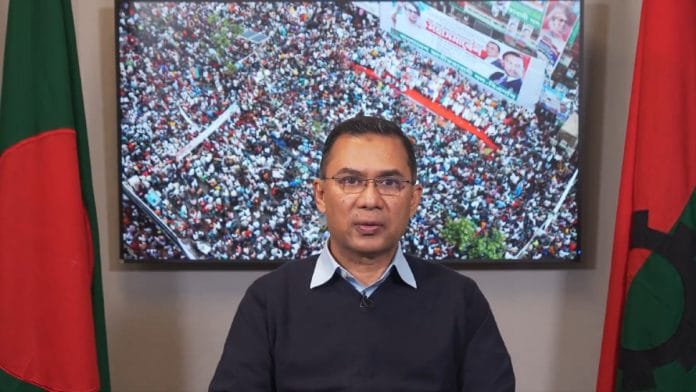New Delhi: Tarique Rahman, the Bangladesh Nationalist Party (BNP)’s acting chairman, as well as son of Khaleda Zia, who was the first woman to emerge as the country’s prime minister, is all set to return to Bangladesh.
The BNP announced Rahman’s return from London after the Bangladesh High Court, on 1 December, acquitted Rahman along with others accused in the 21 August 2004 grenade attacks on the Awami League’s top leadership.
According to Dhaka Tribune, a news publication in Bangladesh, senior BNP leader Mirza Abbas said during the announcement, “That is why Allah has healed him, kept him healthy, and acquitted him.”
The acquittals came in the backdrop of former PM Sheikh Hasina fleeing Bangladesh in a military helicopter on 5 August amid protests against her Awami League government, with the Muhammad Yunus-led interim government subsequently taking over the country’s charge.
Reacting to the court’s decision, Rahman wrote on Facebook, “The beauty of truth is that it inevitably triumphs over propaganda and conspiracy, giving us faith that, eventually, justice and fairness prevail. Let us unite to end political vengeance and open a new chapter in history, where no one’s life or family will be destroyed because of political differences.”
The attack that almost killed Hasina
On Sunday, the Bangladesh High Court overturned the verdict of a lower court in two cases filed in the 21 August 2004 grenade attacks. Delivering the judgment, a bench comprising Justice A.K.M. Asaduzzaman and Justice Syed Enayet Hossain also declared the chargesheet illegal. Rahman was the prime suspect in the attack on a public rally—organised by the then-Opposition Awami League—in Dhaka.
The attack targeted Sheikh Hasina, among other Awami League functionaries, killing 24 leaders and workers, including Ivy Rahman, the president of the Awami League women’s wing, as well as the wife of Zillur Rahman, who later became Bangladesh President. The attack also injured hundreds of other people attending the rally.
In September 2008, Rahman flew to London for his medical treatment and has since then remained there in a self-imposed exile from Bangladesh. In 2018, a Bangladesh court found Rahman and 48 others guilty of the grenade attack.
But this was not the only case against Rahman. In May 2003, Dhaka Tribune ran a three-part series “on patronisation of bribery and financial irregularities during the 2001-06 period (BNP tenure) based on documentary evidence”, referring to Rahman as the “dark prince” and delved into allegations of corruption, as well as media intimidation.
“Tarique helped create and maintain bribery, embezzlement and a culture of corruption, while his theft of millions of dollars in public money has undermined political stability in this moderate, Muslim-majority nation,” the report said, quoting a US embassy cable.
On Sunday, soon after the court acquitted Rahman, Bangladesh Swadhinata Forum, a pro-BNP platform, organised a programme titled ‘Independence, democracy and voting rights in the current context’.
Speaking at the programme, Abbas said a foreign power masterminded the August 2004 grenade attack and that the BNP was never involved. “A foreign power sought to frame our leader Begum Khaleda Zia and our BNP acting chairman Tarique Rahman by orchestrating the misdeeds,” he said.
Return to polls
Rahman’s impending return to Bangladesh may put pressure on the administration of Yunus, the caretaker of the Bangladesh interim government, to prepare for the next national elections.
While Bangladesh has been in turmoil, with reports of targeted attacks on the minority Hindu population, the BNP is getting impatient for the next national elections to elect a party to power.
Last month, top leaders of the party said unless the interim government issues a roadmap to the next election in the next two to three months, the BNP may take to the streets by March or April next year. “As there is no roadmap to the election, we see chaos in almost every sector. Prices of essentials are skyrocketing while the law and order situation has not improved,” Iqbal Hasan Mahmud Tuku, a BNP standing committee member, told the Bangladeshi publication, The Daily Star, at the time.
“The Yunus government is unconstitutional. Neither he nor the members of his administration were elected to power. It had one mandate, and that was to pave the way for the next round of elections—which it is not doing,” political journalist Shahidul Hasan Khokon told ThePrint.
Khokon said all political parties in Bangladesh are getting impatient about the election dates since there is a growing fear among them that Yunus may not want to step down soon.
“Under such circumstances, Rahman’s return to Bangladesh will pressurise Yunus to call an early election. Rahman is a popular BNP leader. The BNP rank and file are jubilant about his return. Hopefully, this will take Bangladesh on the democratic path again,” Khokon said.
(Edited by Madhurita Goswami)
Also Read: Chhatra League leaders hide for safety in Bangladesh. They’re organising to bring back Hasina






